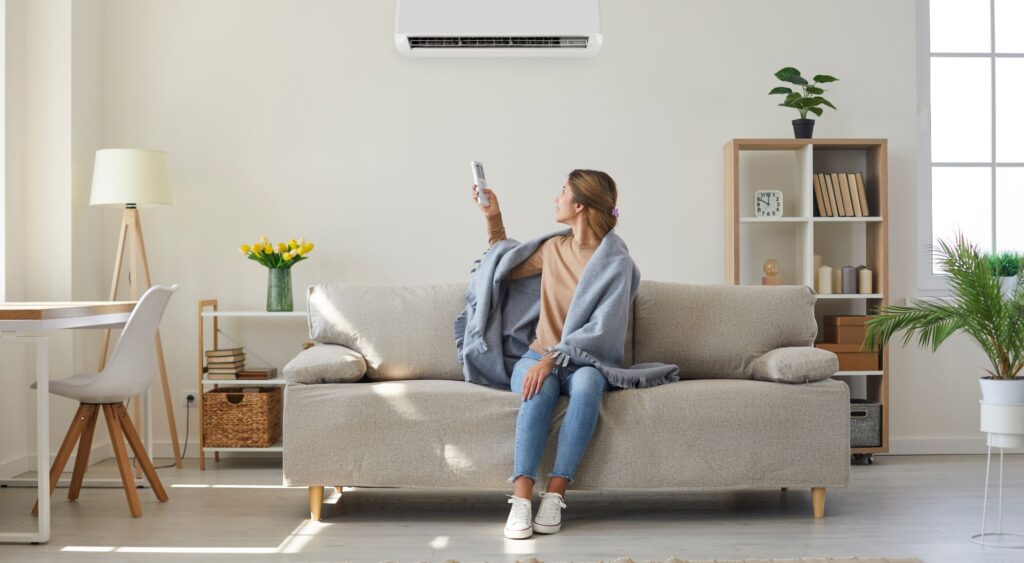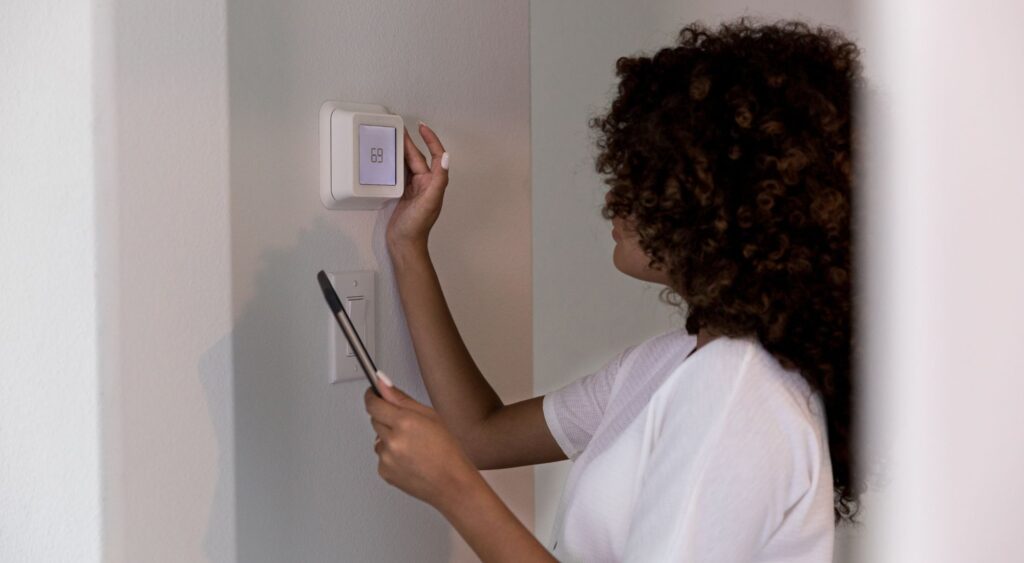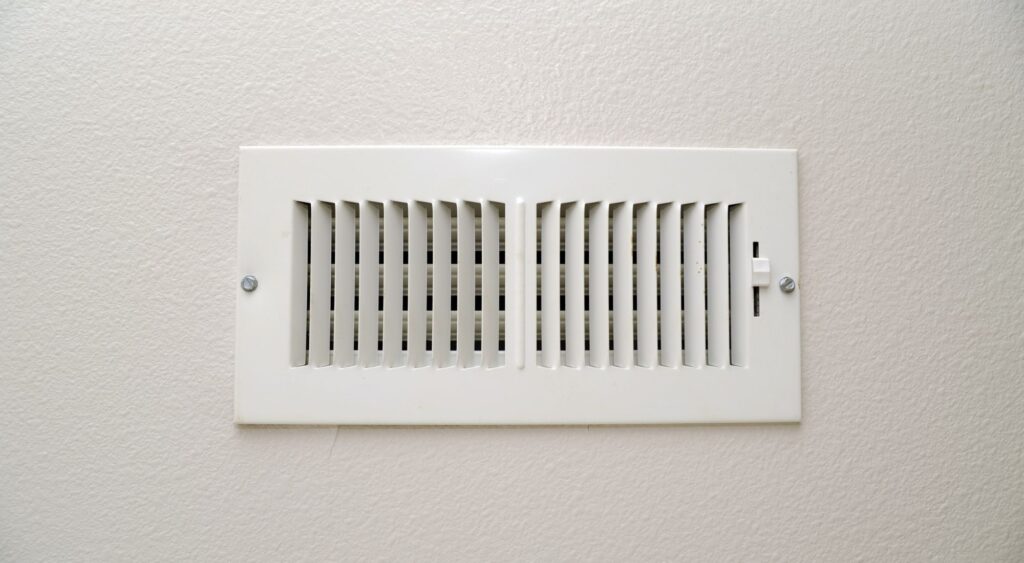Getting To Know Your HVAC Damper: Definition, Benefits, and FAQs
As a homeowner, no one expects you to have an encyclopedia of knowledge about your HVAC system, which is why you probably heard the term “HVAC damper” before but had no clue what it was.
Fortunately, AAA Heating and Cooling would be happy to get you up to speed on all the ins and outs of HVAC dampers.
Along with providing excellent service, our extensive HVAC knowledge can hardly be contained. Here, we will explain what a damper HVAC is, discuss its benefits, and address any other questions you may have.
Table of Contents
- What Is a Damper HVAC?
- How Do Dampers Work?
- Benefits of HVAC Dampers
- Other Common Questions About HVAC Dampers
- AAA Heating and Cooling: Residential HVAC Service, Repair & Installation in Beaverton & Portland
What Is a Damper HVAC?
A damper is a movable small valve or plate that controls the airflow in a building’s HVAC system.
These mechanisms regulate temperature through a zoning system. Zoning systems divide your home heating and cooling into different zones, giving you more options to control your air climate and energy usage.
Dampers monitor airflow, temperature, and humidity levels in your home while lowering or raising the zone’s temperature to your desired setting.
How Do Dampers Work?
Dampers control your home’s heating and cooling by opening and closing to limit one area while increasing it to the other.
HVAC zone dampers come in two types, manual and motorized:
- Manual dampers: These require the homeowner to twist a handle to regulate the airflow into a particular zone.
- Motorized or automatic dampers: These dampers work with your programmable zoning system and function independently. Because it works in tandem with programmable thermostats and other HVAC control systems, it tends to be more convenient and energy-efficient for homeowners.
Benefits of HVAC Dampers
One of the main benefits of dampers is that they improve your HVAC system’s control over airflow, therefore resulting in various other benefits.
Damper systems function differently than residential vent systems. Closing a vent on the floor or the wall will still allow air to travel through your ducts, thus wasting energy. HVAC dampers are located closer to the mouth of the distribution pipe, allowing them to regulate airflow as needed.
By preventing air leaks, dampers may help lower energy bills while also:
- Reducing noise (from the HVAC system)
- Saving energy
- Maximizing home comfort levels
- Lowering energy bills
One 2022 study found that home zoning systems may reduce heating and cooling bills by up to 30 percent. If you are looking to increase energy efficiency and save on utility bills, it might be time to consider a residential zoning system.
If you’re considering damper installation, AAA Heating and Cooling would love to help.
Our expert HVAC contractors in Beaverton and Portland can help you choose the right solution for your home or business. We are a family-owned company that is dedicated to providing quality services, repairs, installations, and outstanding customer service.
With every job we are assigned, we make sure to consider all of the factors to help you make informed decisions.
Other Common Questions About HVAC Dampers
Does Every HVAC System Have a Damper?
Not every HVAC system has dampers, but most do.
However, the number of dampers in a home may depend on its size and the HVAC system. Some builders may not choose to install dampers in homes to cut costs. If you do not have dampers, don’t worry!
A trusted HVAC professional should be able to install them. They will consider the size of your ducts, the type of dampers required, how to zone your rooms properly, and more.
AAA Heating in Cooling has provided reliable HVAC services to Portland and Beaverton communities for over 60 years. With an A+ Better Bureau Business (BBB) rating and commitment to high-quality products and services, no HVAC job is too little or too big for our team.
If you’re in the Beaverton or Portland area and need dampers installed, contact our team to schedule an appointment today.
Is It Okay To Close HVAC Dampers?
Yes! You can adjust your home’s temperature in various rooms by adjusting (opening/closing) your furnace’s dampers.
A manual HVAC damper contains a door that can be manually opened or closed to adjust airflow in a particular zone or room’s ductwork. To locate your dampers:
- Locate the main duct trunks leading from the furnace
- Look 2 to 6 feet off of the main trunk to easily identify your dampers
Once you have located your dampers, you can use the handle on each to either close or open them. The handle should be perpendicular to the duct when closed and pointing down the duct when opened. Each damper is associated with a specific room, so it’s essential to identify and label them.
How Long Do Dampers Last?
The quality of the equipment, how frequently you run your HVAC unit, and whether you follow regular maintenance schedules can all affect the lifespan of your HVAC components. With proper maintenance, dampers can last around 20 years.
AAA Heating and Cooling also offers seasonal HVAC maintenance plans that allow you to ensure your HVAC system is well-maintained without having to worry about it. A well-maintained HVAC system will extend its life and protect it from unexpected (and inconvenient) breakdowns.
How Do You Know If an HVAC Zoning System Works For Your Home?
Some homes have dampers installed in every run, some have only a few, and some have none.
HVAC dampers are good for any homeowner looking to save on their energy bills and increase their system’s efficiency.
When Having an HVAC Zoning System Makes Sense
You may want to consider installing an HVAC damper and zoning system if you have:
- A multi-level home: Since hot air rises, the upstairs rooms in your home may sometimes feel much warmer than the downstairs. An automatic dampening system might help you set different temperatures for the upstairs and downstairs of your home with one thermostat.
- A home with high ceilings: Homes with high ceilings may often experience trapped heat at the top. By using dampers to zone your HVAC system, you can increase your room’s temperature more frequently and circulate the air more strategically.
- A home with large windows: Sunlight can raise your home’s temperature in certain spots. A damper HVAC allows you to make rooms with large windows their own cooling zone to avoid uneven cooling. Then all the cooling power is sent to where it needs to be the most.
AAA Heating and Cooling has the industry knowledge to help efficiently coordinate and conduct your HVAC dampers installation.
We will walk you through the installation process while suggesting other helpful HVAC tips that might save you money, enhance your system’s efficiency, extend your system’s lifespan, and improve your home’s comfort levels.
Do you have other HVAC damper questions that you don’t see mentioned above? Just contact one of our heating and cooling professionals; we would love to talk about HVAC!
AAA Heating and Cooling: Residential HVAC Service, Repair & Installation in Beaverton & Portland
Considering a zoning system? Looking to repair or upgrade your existing model? Curious to learn more about zone dampers?
AAA Heating and Cooling is at your service.
We have proudly served the Beaverton and Portland area since 1961. Over the years, we’ve collected extensive HVAC knowledge and used it to solve various heating and cooling issues. From installing dampers on your existing HVAC system to retrofitting systems in older homes, there is little we can’t do.
If you need HVAC services and would like to join the ranks of our many satisfied clients, request an appointment today.
14 HVAC System Tips for New Homeowners in Portland
 Are you a first-time homeowner in the Portland metro area? If so, HVAC systems might be unfamiliar to you. Want to learn HVAC equipment basics and maintenance tips from top experts? Our local HVAC company shares heating and cooling fundamentals below.
Are you a first-time homeowner in the Portland metro area? If so, HVAC systems might be unfamiliar to you. Want to learn HVAC equipment basics and maintenance tips from top experts? Our local HVAC company shares heating and cooling fundamentals below.
HVAC Tips for Beginners
What is an HVAC system? HVAC stands for “heating, ventilation, and air conditioning.” As the name suggests, HVAC units are responsible for all your residential heating and air conditioning needs. While HVAC systems are complex machines with many intricate parts, there are nine main components you should be familiar with. Keep in mind not all HVAC units are alike, so consult your professional HVAC contractor with any questions.
9 Basic HVAC Components
1) Furnace
Your furnace is designed to heat air and push it through your duct system to properly warm up your home. Furnaces can run off of electricity or natural gas, come in single-stage or two-stage options, and are often installed in your garage, basement or utility closet.
2) Heat Exchanger
The heat exchanger is not technically part of your furnace, although it is often located inside of your furnace. The furnace is responsible for moving hot air into your ducts, but the heat exchanger converts cold air to warm air via the combustion chamber.
3) Evaporator Coil
Also located inside of your home furnace, the evaporator coil helps to cool your indoor air. Refrigerant circulates through the coil, which allows the evaporator coil to absorb heat from the incoming air. The chilled air then blows through the ducts to help cool your residence.
4) Condensing Unit
The condensing unit serves a similar function as the evaporator coil; however, the condensing unit is typically located outside your home and gives off heat.
5) Refrigerant Tubes
Refrigerant tubes connect the evaporator coil to the condensing unit. They are usually made of metal, contain refrigerant, and join the indoor and outdoor units.
6) Thermostat
Thermostats allow you to control the internal temperature of your home. Typically mounted on the walls of a home, they can be located throughout your residence. You can find manual, programmable, and smart options. Programmable thermostats can often help save energy costs.
7) Ductwork
Ductwork allows warm or cool air to be distributed throughout your home via air ducts. Hot or cool air is pulled into your HVAC system, where it is conditioned, then pushed back out to maintain ideal indoor temperatures. Ducts can be located in attics and in the ceiling spaces.
8) Vents
As conditioned air moves through the ducts, it enters rooms in your home through air vents.
9) Heat Pump
A residential heat pump provides both heating and cooling. During colder months, the heat pump transfers cold air from the inside to the outside. In the warmer months, it does the exact opposite.
5 HVAC Tips for Portland Homeowners
1) Know Your HVAC System
As an Oregon homeowner, you need to know what type of HVAC system you have. This will help you troubleshoot potential problems and plan your routine maintenance schedule.
The most common system is known as the central air conditioning system and includes all the components listed above. Some homes, however, could have ductless systems. It’s also a good idea to know if your home uses a gas or electric furnace, or a boiler system.
2) Don’t Close Your Vents
Keeping air vents open allows for proper air distribution throughout your home. Closed vents force your HVAC system to work harder and less efficiently.
3) Inspect and Clean Your Ductwork
As a new homeowner, it’s important to have your ducts inspected and cleaned by a professional. Dirty and clogged ducts can contribute to poor indoor air quality and increase energy costs.
4) Replace Your Air Filter
One of the first maintenance steps you can take in your new home is to replace the air filter. Choose one that fits the best needs for your residence. Plan to replace your air filter every three months.
5) Develop an HVAC Maintenance Schedule
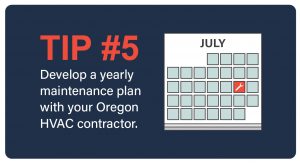 Upon moving into your new home, contact your Oregon HVAC contractor and schedule a maintenance visit. Once all issues have been addressed, develop a yearly maintenance plan with your contractor. Taking care of your HVAC system will keep your unit performing its best and can save you on energy costs.
Upon moving into your new home, contact your Oregon HVAC contractor and schedule a maintenance visit. Once all issues have been addressed, develop a yearly maintenance plan with your contractor. Taking care of your HVAC system will keep your unit performing its best and can save you on energy costs.
Residential HVAC Services for Your Portland Home
If you are new to HVAC systems and need expert advice, AAA Heating and Cooling is here to help. Whether you are looking to schedule a routine visit or have an issue that requires immediate attention, our trained technicians can get the job done. Contact us today and let us assist you with all your HVAC needs.
5 Money Saving Heating & Cooling Tips for Homeowners
 Let’s face it, we can all use some help reducing our heating and cooling costs. We all want to save money on energy bills and get the most out of our HVAC systems. The more efficient our heating and cooling systems are, then less impact they have on our wallet and the environment.
Let’s face it, we can all use some help reducing our heating and cooling costs. We all want to save money on energy bills and get the most out of our HVAC systems. The more efficient our heating and cooling systems are, then less impact they have on our wallet and the environment.
Our HVAC company in Beaverton is here to help you keep your residential HVAC system running smoothly and help you save on utility costs.
Home Heating and Cooling Cost Savings
Are your utility costs higher than you’d like? Before you invest in a new HVAC system, there are a few tips to help increase energy efficiency and lower your bills. From routine maintenance to ENERGY STAR equipment upgrades, AAA Heating and Cooling has the best solutions to managing your residential energy costs.
5 HVAC Tips to Save Money on Your Energy Bills
1. Check and Change Your Air Filter Frequently
Dirty air filters can impede airflow and cause HVAC units to work harder to maintain your ideal indoor temperature. This added stress on your unit can result in wasted energy and higher utility bills.
To avoid clogged and dirty air filters, our HVAC installers recommend checking your air filters every other month. If you notice any dirt or debris, change the filter right away. Otherwise, plan to install a new air filter every three months. Sticking to this schedule will help prevent dust and dirt from accumulating in the system.
2. Install a Programmable Thermostat
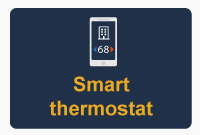 Investing in a programmable thermostat can help save you on energy costs. In the average household, nearly half of the yearly energy bill goes towards heating and cooling. Controlling your temperature settings allows you to save more while still maintaining a comfortable air climate.
Investing in a programmable thermostat can help save you on energy costs. In the average household, nearly half of the yearly energy bill goes towards heating and cooling. Controlling your temperature settings allows you to save more while still maintaining a comfortable air climate.
You can always shut off your unit while you are away, but this can cause other potential problems. For example, turning off your AC unit in the summer might increase humidity levels. Programmable thermostats allow you to set your ideal temperatures while at home and away, reducing energy waste.
3. Schedule Routine HVAC Maintenance
HVAC systems are complex machines that require routine tune-ups to keep them functioning at peak performance. Even if you’re not experiencing any problems with your residential HVAC unit, it’s a good idea to have your systems checked annually.
Your HVAC contractors will thoroughly check and tune-up all components of your unit including:
- Thermostat settings
- System controls
- Electrical connections
- Gas connections, pressure, burner combustion, and heat exchangers
- Air conditioning coils and refrigerant
Performing annual maintenance will help ensure maximum efficiency and improve the longevity of your unit.
4. Inspect and Seal Your Heating and Cooling Ducts
Ducts that transfer air to-and-from heat pumps, central air conditioners, and forced air furnaces can waste energy if not properly sealed. To help maintain energy efficiency, have your local HVAC installer seal the seams and connections of your duct system. Once your ducts are properly sealed, schedule professional duct cleaning every three to five years.
For even more energy-saving, consider investing in ductless heating and cooling. An alternative to forced air systems, ductless cooling and heating can save you on overall energy costs over time.
5. Choose ENERGY STAR rated HVAC Equipment
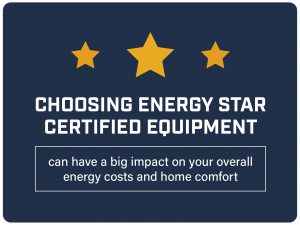 If your HVAC system isn’t performing at its best, has low-efficiency ratings, or is more than 10 years old, it might be time to consider investing in a new system.
If your HVAC system isn’t performing at its best, has low-efficiency ratings, or is more than 10 years old, it might be time to consider investing in a new system.
Choosing ENERGY STAR certified equipment can have a big impact on your overall energy costs and home comfort. What’s more? It has a better positive environmental impact.
Contact Our Beaverton HVAC Company for Your Heating & Cooling Needs
From recommendations on certified ENERGY STAR equipment to performing routine maintenance, our HVAC installers are dedicated to helping you achieve energy efficiency. We proudly serve the Beaverton and Portland metro area, with two locations for all your service needs.
Click to View or Download Our Checklist
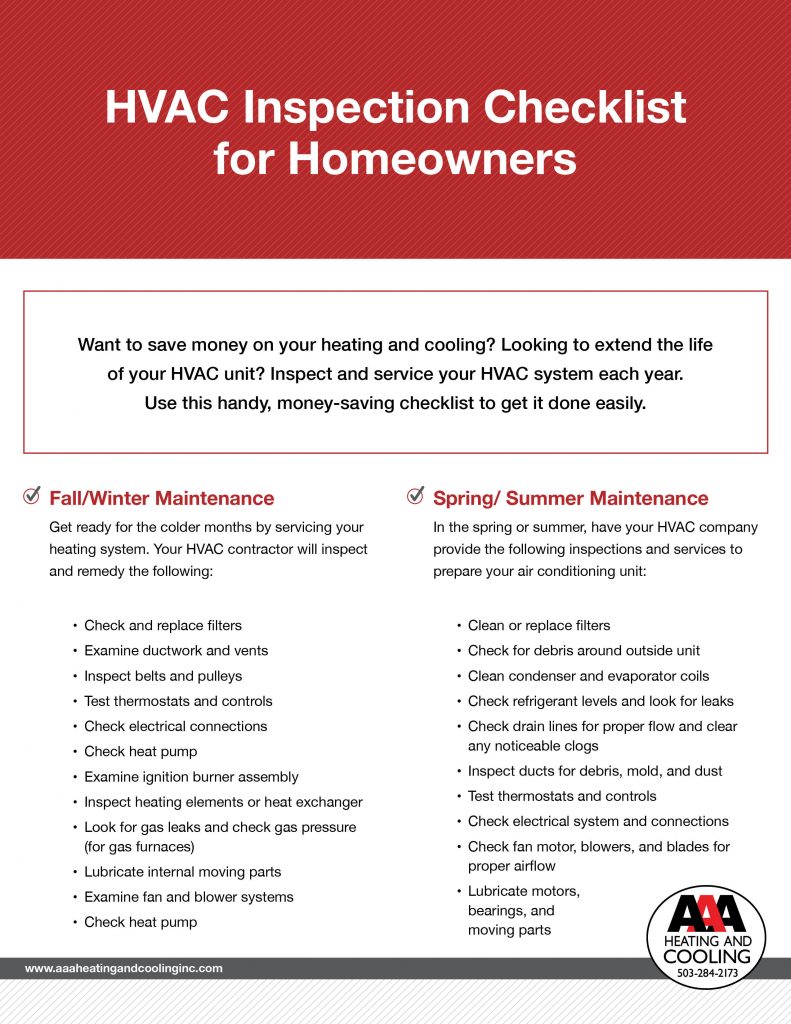
Is Portable or Ventless AC Better for Your Beaverton Home?
 With summer right around the corner, many Pacific Northwest residents are starting to think about how best to stay cool as our days begin to warm up. If you are considering purchasing a portable unit for your home or apartment it’s important to know the options available to you.
With summer right around the corner, many Pacific Northwest residents are starting to think about how best to stay cool as our days begin to warm up. If you are considering purchasing a portable unit for your home or apartment it’s important to know the options available to you.
What AC units are better for your needs? Need to learn the difference between portable AC and ventless air conditioning units? Our Beaverton HVAC contractors provide details and answers below.
Types of Residential Air Conditioning Systems
You may not be aware that there are two types of portable air conditioning options for your home: portable AC and ventless AC. Both have unique cooling options with their own set of pros and cons. To help you make an informed decision on which one is right for you, check out the facts below:
The Difference Between Portable and Ventless Air Conditioners
To ensure you purchase the right air conditioner for your home, it’s first necessary to understand the difference between portable and ventless AC units.
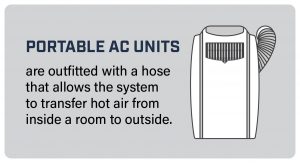 Portable AC units are outfitted with a hose that allows the system to transfer hot air from inside a room to outside. Due to their design, they must be installed next to a window in order for the hose to vent warm air outdoors. Once the exhaust is set up, all you have to do is plug in your portable air conditioning unit and turn it on.
Portable AC units are outfitted with a hose that allows the system to transfer hot air from inside a room to outside. Due to their design, they must be installed next to a window in order for the hose to vent warm air outdoors. Once the exhaust is set up, all you have to do is plug in your portable air conditioning unit and turn it on.
Ventless air conditioners, also known as evaporative air coolers, do not use a hose or vent warm air outside. Instead, these units rely on a tank of water, the process of evaporation, and a fan to circulate the cool air throughout the room.
Choosing Your Air Conditioning Unit
Now that you know the differences between each unit, which is the best solution for you? Let’s examine some pro and cons of each:
1. Portability: While the name, “portable air conditioner,” implies maximum portability, they are actually less moveable than ventless AC systems. Because ventless units don’t come with a hose that requires venting, they can easily be moved from room to room and plugged in. If you are looking to cool down multiple rooms with the ease of one unit, an evaporative air cooler might be right for you.
2. Efficiency: One factor to consider in choosing a portable cooling unit is its energy efficiency. Ventless AC units are more cost-effective upfront, yet they might cost you more in energy costs down the line.
 Portable air conditioners are able to remove warm air from your room and dispel it outdoors, via their venting hose. Ventless units cool the surrounding air, but don’t have the ability to transfer any remaining hot air outside. This can result in you having to run your unit longer to achieve ideal cooling temperatures.
Portable air conditioners are able to remove warm air from your room and dispel it outdoors, via their venting hose. Ventless units cool the surrounding air, but don’t have the ability to transfer any remaining hot air outside. This can result in you having to run your unit longer to achieve ideal cooling temperatures.
3. Cooling Ability: When selecting an air conditioning unit, you want one that cools effectively, while being energy efficient. How effectively an AC unit cools your room can ultimately depend on the humidity levels in your area.
Portable air conditioning units are best for humid climates because they remove moisture from the air and vent it out. Ventless units are ideal for drier climates because they introduce moisture into the air as part of the cooling process.
Here in the Pacific Northwest, we can experience a range of temperatures and humidity levels. That’s why it’s important to work with your HVAC contractor to determine the best air conditioning unit for your home.
Contact Our Beaverton Air Conditioning Installation & Maintenance Professionals
Looking for more guidance on the best air conditioning solution for your needs? AAA Heating and Cooling offers expert advice, installation, and repair for all your HVAC needs. Contact us today to schedule an inspection, or to discuss an upgrade, of your residential AC unit.
3 Reasons Lights Flicker When Your Home’s AC is On
As a homeowner you may have noticed your lights flicker when you power up your air conditioning unit. What causes your lights to dim? Could it be a problem with the AC unit itself? Is there something wrong with the electricity in your home? Our Beaverton residential heating and air conditioning pros answer these questions and more.
Understanding Your Residential Air Conditioning Unit
Think of electricity in your home the same way you do your residential plumbing. Much like the water in your pipes, there is only so much electricity available in your home at any given time. When you flush your home toilet while running a shower, the water pressure splits between the two fixtures. Electricity behaves in a similar manner.
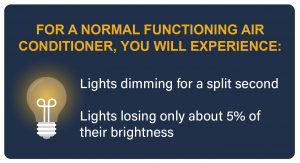 When you turn on a high-energy device, like a modern AC unit, the initial power draw can put a substantial drain on your available electricity. This can cause your lights to dim. While flickering lights might seem worrisome, this is often a normal electrical response to power being diverted.
When you turn on a high-energy device, like a modern AC unit, the initial power draw can put a substantial drain on your available electricity. This can cause your lights to dim. While flickering lights might seem worrisome, this is often a normal electrical response to power being diverted.
How can you tell if the dimming lights are a normal occurrence or signs of a larger problem? For a normal functioning air conditioner, you will experience:
- Lights dimming for a split second
- Lights losing only about 5% of their brightness
Lights that dim for a long time, flicker on and off rapidly, or only dim on particular circuits could be symptomatic of more serious electrical issues. What are the more serious issues and when should you speak with a professional?
1. Damaged or Loose Wires
Do your lights turn off and on quickly when you start up your AC unit? This could be indicative of loose or damaged electrical wires. Faulty wires can cause current loss to your lightbulb. Plus, the voltage drop that occurs when your air conditioner kicks on can exacerbate the problem, making your lights flicker rapidly. Not sure if your wires need repair? Make an appointment with your Beaverton HVAC contractor to check if your wires are discolored, charred, or loose.
2. Weak or Broken Capacitor
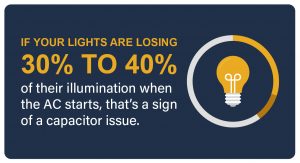 If your lights are losing 30% to 40% percent of their illumination when the AC starts, that’s a sign of a capacitor issue. Your AC capacitor functions like a battery, giving your compression motor the boost of energy it needs to power up. Much like your car battery, your air conditioning compressor can lose its ability to store and maintain power.
If your lights are losing 30% to 40% percent of their illumination when the AC starts, that’s a sign of a capacitor issue. Your AC capacitor functions like a battery, giving your compression motor the boost of energy it needs to power up. Much like your car battery, your air conditioning compressor can lose its ability to store and maintain power.
What does this mean? Your AC is pulling more voltage from other appliances and putting more stress on your compressor to start up. This can cause the lights to temporarily lose their brightness.
3. Overloaded Circuits
Overloaded circuits can present a serious problem. According to the National Electric Safety Code, all major appliances should be on their own dedicated circuit. If you trip your circuit breaker, or hear any buzzing sounds when you turn on your AC unit, you could be overloading your circuits. If you notice any of these signs, unplug any household devices that share the same circuit as your AC unit. This will reduce your risk of fires and electrical shock. For a long term solution, you will need to get a complete assessment and potential repair from your HVAC professionals.
Home HVAC Solutions in Beaverton & Portland
If you aren’t sure what might be causing your flickering lights, call in the experts. AAA Heating and Cooling is your go-to residential HVAC servicing and installation company. We now have two locations, in Portland and Beaverton!
